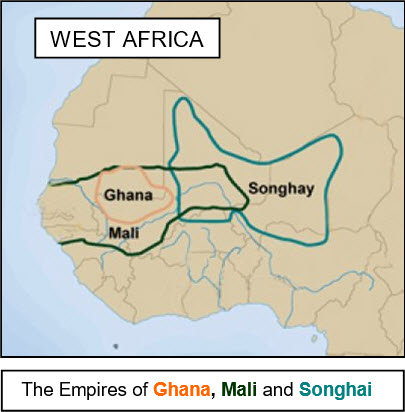


THE OVERTHROW OF THE KINGDOM OF GHANA 1203 (JO)
xxxxxThe Kingdom of Ghana had it origins in the 4th century and by 800 had become a powerful trading empire in West Africa. Its wealth was based mainly on gold and ivory, exported via trade routes to the Atlantic seaboard or across the Sahara to North Africa. As we have seen, in 1076 (W1) an invasion and brief occupation by the Almoravids seriously disrupted this commerce, and the empire began to disintegrate. One break-
 xxxxxThe Kingdom of Ghana, situated in West Africa, had its origins in the fourth century A.D. and by the 800s had become a flourishing and powerful trading empire stretching over parts of today's Mauritania, Mali and Senegal. It owed its wealth and prestige to gold and ivory, obtained from traders coming from the south. These commodities were exchanged for salt and other products using trade routes which ran north across the Sahara to Muslim North Africa and directly west to the Atlantic coast. As the kingdom became more powerful, its territory was expanded so as to take in the gold-
xxxxxThe Kingdom of Ghana, situated in West Africa, had its origins in the fourth century A.D. and by the 800s had become a flourishing and powerful trading empire stretching over parts of today's Mauritania, Mali and Senegal. It owed its wealth and prestige to gold and ivory, obtained from traders coming from the south. These commodities were exchanged for salt and other products using trade routes which ran north across the Sahara to Muslim North Africa and directly west to the Atlantic coast. As the kingdom became more powerful, its territory was expanded so as to take in the gold-
xxxxxBut with the emergence in Morocco of the fanatical Muslim Almoravids, bent upon carrying a holy war both north into Spain and south into the Sahara, the prosperous days of the Kingdom of Ghana were numbered. As we have seen, its territory was overrun in 1076 (W1), and whilst the occupation only lasted for a few years, it was sufficient to seriously disrupt the trade upon which the empire so much depended. Neighbouring clans, once subject to and dependent on this powerful trading nation, now broke away and claimed independence.
 xxxxxOne such clan, the Susu, under its ruler King Sumanguru, created a small empire by overrunning some of these small states. Then in 1203 Sumanguru occupied the capital of Ghana, Kumbi Saleh, intent upon reviving its fortunes as the centre of the lucrative trade routes that crossed the Sahara. His harsh rule, however, and his inability to maintain law and order worked against him. Soon after his occupation the traders abandoned Kumbi Saleh in favour of more stable trading centres. The Susu Empire went rapidly into decline and, as we shall see, in 1235 (H3) was eventually absorbed into the new Sudanese empire, that of Mali.
xxxxxOne such clan, the Susu, under its ruler King Sumanguru, created a small empire by overrunning some of these small states. Then in 1203 Sumanguru occupied the capital of Ghana, Kumbi Saleh, intent upon reviving its fortunes as the centre of the lucrative trade routes that crossed the Sahara. His harsh rule, however, and his inability to maintain law and order worked against him. Soon after his occupation the traders abandoned Kumbi Saleh in favour of more stable trading centres. The Susu Empire went rapidly into decline and, as we shall see, in 1235 (H3) was eventually absorbed into the new Sudanese empire, that of Mali.
Acknowledgements
Map (West Africa): licensed under Creative Commons -
JO-


